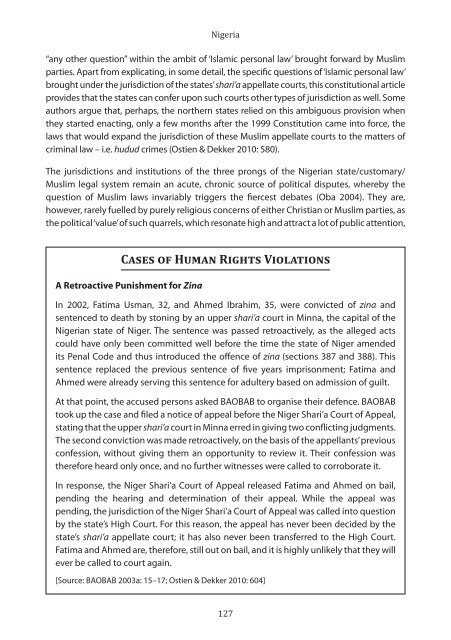control and sexuality
control and sexuality
control and sexuality
- No tags were found...
You also want an ePaper? Increase the reach of your titles
YUMPU automatically turns print PDFs into web optimized ePapers that Google loves.
Nigeria“any other question” within the ambit of ‘Islamic personal law’ brought forward by Muslimparties. Apart from explicating, in some detail, the specific questions of ‘Islamic personal law’brought under the jurisdiction of the states’ shari’a appellate courts, this constitutional articleprovides that the states can confer upon such courts other types of jurisdiction as well. Someauthors argue that, perhaps, the northern states relied on this ambiguous provision whenthey started enacting, only a few months after the 1999 Constitution came into force, thelaws that would exp<strong>and</strong> the jurisdiction of these Muslim appellate courts to the matters ofcriminal law – i.e. hudud crimes (Ostien & Dekker 2010: 580).The jurisdictions <strong>and</strong> institutions of the three prongs of the Nigerian state/customary/Muslim legal system remain an acute, chronic source of political disputes, whereby thequestion of Muslim laws invariably triggers the fiercest debates (Oba 2004). They are,however, rarely fuelled by purely religious concerns of either Christian or Muslim parties, asthe political ‘value’ of such quarrels, which resonate high <strong>and</strong> attract a lot of public attention,Cases of Human Rights ViolationsA Retroactive Punishment for ZinaIn 2002, Fatima Usman, 32, <strong>and</strong> Ahmed Ibrahim, 35, were convicted of zina <strong>and</strong>sentenced to death by stoning by an upper shari’a court in Minna, the capital of theNigerian state of Niger. The sentence was passed retroactively, as the alleged actscould have only been committed well before the time the state of Niger amendedits Penal Code <strong>and</strong> thus introduced the offence of zina (sections 387 <strong>and</strong> 388). Thissentence replaced the previous sentence of five years imprisonment; Fatima <strong>and</strong>Ahmed were already serving this sentence for adultery based on admission of guilt.At that point, the accused persons asked BAOBAB to organise their defence. BAOBABtook up the case <strong>and</strong> filed a notice of appeal before the Niger Shari’a Court of Appeal,stating that the upper shari’a court in Minna erred in giving two conflicting judgments.The second conviction was made retroactively, on the basis of the appellants’ previousconfession, without giving them an opportunity to review it. Their confession wastherefore heard only once, <strong>and</strong> no further witnesses were called to corroborate it.In response, the Niger Shari’a Court of Appeal released Fatima <strong>and</strong> Ahmed on bail,pending the hearing <strong>and</strong> determination of their appeal. While the appeal waspending, the jurisdiction of the Niger Shari’a Court of Appeal was called into questionby the state’s High Court. For this reason, the appeal has never been decided by thestate’s shari’a appellate court; it has also never been transferred to the High Court.Fatima <strong>and</strong> Ahmed are, therefore, still out on bail, <strong>and</strong> it is highly unlikely that they willever be called to court again.[Source: BAOBAB 2003a: 15–17; Ostien & Dekker 2010: 604]127


